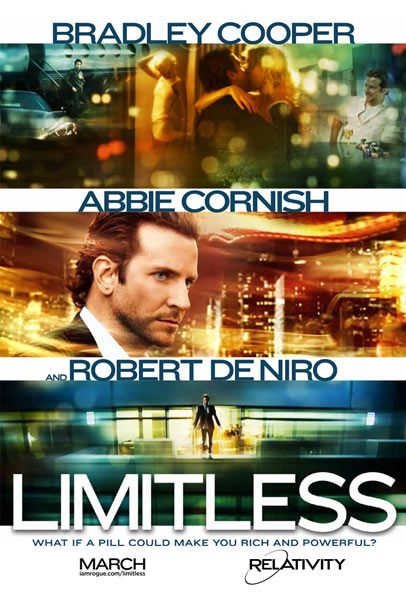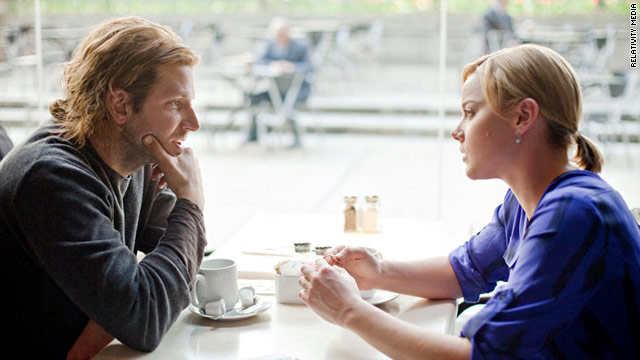

Director: Neil Burger, 2011 (PG-13)
Our brains, we are told, use a mere fraction of their
potential. If we could harness all of this, our intelligence would be
limitless. At least, that is the premise of this mindless but surprisingly
engaging thriller.
Eddie Morra (Bradley Cooper, Silver Linings Playbook) is a
struggling writer. Looking like a bum, his writer’s block has him one stop from
eviction. And when his girlfriend Lindy (Abbie Cornish) dumps him, he appears
to have lost it all. But after chance encounter with his brother-in-law, a
low-level drug dealer, Eddie finds himself with a new experimental drug, NZT.
When he takes it, his brain is opened up to its fullest potential and his mind
is blown in an apparently positive manner. As he comments in voice-over, “A
tablet a day and I was limitless.” He knocks out half his manuscript in no time
flat, and wants more NZT. He gets it, but it comes at a cost.
With the drug, Eddie is able to learn a language in a week,
connect forgotten facts from his past memory to solve problems, and he can read
the stock market like a children’s book. He even gets his act together and wins
Lindy back.
 The story escalates when he borrows money from a Russian
mobster to use in the stock market under his new guise as a broker. And here he
meets Carl Van Loon (Robert De Niro), a Warren Buffet-like figure who is hard
and ruthless but who will use Eddie to enable his current merger. With the mob after him, Van Loon needing him,
a mystery man tailing him, and the pills in short supply, Eddie finds his life
is less limitless than he thought.
The story escalates when he borrows money from a Russian
mobster to use in the stock market under his new guise as a broker. And here he
meets Carl Van Loon (Robert De Niro), a Warren Buffet-like figure who is hard
and ruthless but who will use Eddie to enable his current merger. With the mob after him, Van Loon needing him,
a mystery man tailing him, and the pills in short supply, Eddie finds his life
is less limitless than he thought.
Limitless is actually rather limited. As an action-thriller,
it does keep up an excellent pace. With the excellent camerawork and intriguing
effects to communicate Eddie’s transition from normal to “superhuman”, the film
carries us along, enabling us to overlook the numerous plot holes along the
way. Cooper even gives a nuanced performance as a man who is in total control
one minute, and a panicked addict craving another fix the next. But there is
little depth to the other characters and the ending leaves us wondering as it
seems inconsistent with the rest of the film.
Then the film offers little in the way of a moral message,
not commenting positively or negatively about drug use, its central tenet. It
seems to suggest that self-improvement is the goal for all humanity and any way
to reach that goal is justified. But the ends really do not support the means
involved here.
Self-improvement is not our ultimate goal. Of course, if we
can grow and improve, that is wonderful. But it is a secondary part of our
journey. Learning Italian just so we can impress a date in a restaurant is a mostly
selfish and shallow motivation.
Using drugs to feel good or to escape the pain of living is
immoral and illegal. It is temporary and defers additional pain, both for the
abuser and for those around. Even if it is does offer some physical or mental enhancement,
these wear off and often leave the abuser worse off than before. The cost is
simply too high. Some of the characters in the film realize this, but not
Eddie. Somehow, he beats the odds and becomes the one drug user who can conquer
his addiction, an unlikely event.
Our real goal, though, is to heal our brokenness. We are
broken and blind. As Eddie says, early in the film, “I was blind, but now I see.” This is more
than a biblical allusion. It is a direct quote from the blind man who was
healed by Jesus (Jn. 9:25). Jesus came
to offer that solution to our brokenness, which includes physical, emotional
and spiritual healing. Most of all, through his sacrifice on the cross, he
offers all of us a chance to be restored into relationship with God. We can
enter into the family of God as children (Jn. 1:12), redemptively healed even
as we will find full holistic healing in the age to come.
We will not find experience limitless intelligence in this
life, through drugs or other means. But we will find relationship with the one
who has limitless intelligence if we give ourselves over to Jesus Christ. With
him, there is no need for NZT.
Copyright ©2013, Martin Baggs


No comments:
Post a Comment